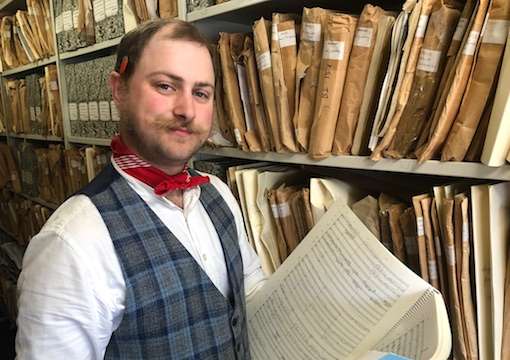“There’s no standard day or week – which we’d like to have – but very rarely do have. One day I might be sorting music and preparing for a concert, the next day I might be ‘bowing’ an opera, the following day I might be writing up transpositions,” Alastair Simpson, Head Librarian of the Bournemouth Symphony Orchestra, tells me while I’m admiring the endless shelves of the library behind him. There must be hundreds of thousands of scores, editions and orchestral parts, and it’s impossible not to see the pride and joy in the eyes of Alastair, who looks after them: “It certainly has some weight.”

What people might be most surprised about is how far orchestra librarians have to work ahead. When I talked to Alastair in mid-May, most of the programmes for the summer were already set up. “In a few weeks time I’ll be looking at the next season. When the new season starts, I’ll be thinking about Christmas, and at Christmas I’ll be thinking about the second half of the season. We work that far ahead so we can deal with any problems as they come up.” If the scores are on the shelf you just need to find them and bring them out, but if the music needs to be ordered or hired, the librarian needs to contact the publisher in good time. “Next season we perform this newly discovered Liszt melodrama [Vor hundert Jahren (A hundred years ago)]. We’ve already ordered the music from Weimar who are sending it with post so it could take a while.”
Early in the week, the scores of last week’s concerts are being returned to the library and need to be checked, sorted and put away on the shelves or sent back to the publisher. Thursdays and Fridays are their “catch-up days” when they have fewer distractions and can continue with organising music for further ahead. “We try to work six weeks ahead of any given concert, so that the music is ready for the musicians to look at well in advance. They can then take away the parts to practise, just have a glance through or make sure there is nothing in there that worries them.” Before that time, Alastair has to make sure that all the parts are there and that all the bowings and cuts match. Once the concert starts, his job is done for this particular programme. So every musician is responsible to bring their own part? “We always provide extra string parts. Because there are so many string players, it’s more likely that one of them might lose it. Not that string players are any more forgetful…”
During a typical season, the BSO performs over 140 concerts, and you can imagine the enormous number of scores and parts that are in use at any given moment. All these scores and parts are the responsibility of the librarians who juggle a multitude of duties to ensure that the rehearsals and, most of all, the concerts can run seamlessly. “One of the main tasks are bowings, writing the brackets to mark an up- or down-bow. The fact that when you watch the orchestra or the strings all bows go up and down the same way is not just about aesthetics, it has a technique to it as well.” Usually, the leader will decide on the bowings and, if it’s a new work for the orchestra, they will bow their part, and Alastair will copy it into the scores of the section leaders. “It’s quite a large job, especially for something like opera. Sometimes it’s just easier to take the music away for a weekend and to head down and get on with it, not worrying about any other jobs.”
Most conductors and soloists are happy to use the editions that the library has at its disposal. But some requests are certainly a bit more tricky and require detective work. “The works from our Voices from the East series have been an education in trying to track down unusual pieces of music. They are certainly not unusual in Ukraine, Armenia or Azerbaijan or any of the other places where the composers are from and well known, but in the UK they might not have an agent or publisher. For Avet Terterian’s Fourth Symphony Kirill [Karabits] wanted the original version, which isn’t published. The Terterian Estate has the one handwritten set that exists, so they photocopied and scanned it and emailed it to us. We then rearranged and printed it here – the wonders of modern technology.”
In addition to preparing new parts, the librarians work to keep existing parts in usable condition and ensure that the paper of the scores is still strong enough to last through another subscription cycle. The process of repairing a score is a craft itself. “Being such an historical orchestra, a lot of our music dates back decades if not a hundred years or more. We use special archival tape to put it back together, but eventually, the music just becomes too worn to be used any more, in which case we’ll buy new sets.” Alastair holds two astonishing Elgar scores into the camera. “This one is stuck together with World War 1 bomb stamps from 1915, and this is a conductor’s score, signed by Edward Elgar himself when he came here.” Walking down the shelves of the library must sometimes feel like walking back in time.
Orchestra librarians tend to have varied backgrounds as there is no specific training or route into the library, yet they all share a passion for music and often a history as instrumentalists themselves. Alastair, a music graduate, started at the BSO in a six-month marketing internship in 2014, during which he “showed a bit too much interest in what the library does”. His foot into the library door was another internship that became available after his initial six months with the orchestra and he’s been there ever since, recently becoming Head Librarian.
So what are the skills you need as a librarian? “Being organised, being careful, being neat, musical knowledge. It’s just a case of getting stuck in and learning, and yes, you make mistakes, it’s learning how to deal with mistakes and dig yourself out of that hole.”
The BSO’s Resound Ensemble has been a recent education for Alastair. In 2018, the BSO became the first orchestra in the world to form a professional disabled-led ensemble and, only six months after its creation, BSO Resound became the first disabled-led ensemble to perform at the BBC Proms. “We provide the parts for the flautist Kate [Risdon] who is blind. She needs the music well in advance – I think three months rather than six weeks – so it can be converted into Braille beforehand which she reads and memorises. I learned all this in one phone conversation with her. It’s the same letters of Braille, but they mean different things if it’s musical Braille. It’s also a similar code to mathematical Braille. It’s been a great education in things that need to be done by the library that other people might not even think of.”
Any given day during the season looks a bit different and there’s certainly no standard day in the life of an orchestra librarian, but, at least for Alastair, that seems to be the most exciting and enjoyable part of the job.


